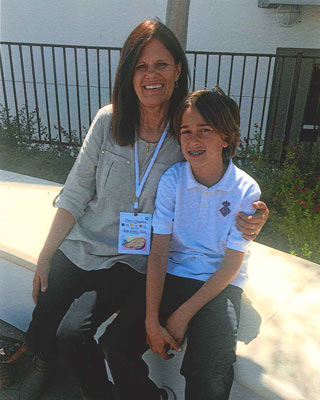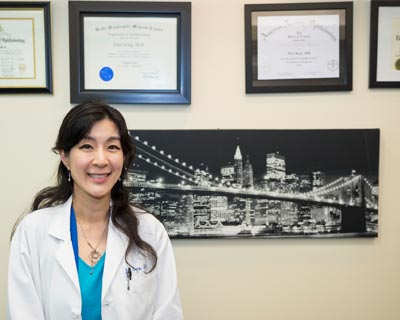Known Family History Brings Warning Signs
Christine Chapman knew she was at risk of developing glaucoma. Her mother lost much of her vision to the eye disease. When her own vision started to fail, she went into panic mode, and immediately called her health insurer. The wait to see an ophthalmologist — a physician who specializes in medical and surgical eye care — was an astounding six months. But she knew the type of glaucoma her mother suffered from could truly turn into a medical emergency.
There had to be a better option. And she found it in The American Academy of Ophthalmology’s EyeCare America program®.
“I searched around online to see if I could get any help. I needed an exam now. Something was wrong, and I just couldn’t wait,” Christine said. “That’s how I found out about EyeCare America.”

Christine with her grandson.
EyeCare America provides medical eye exams, often at no out-of-pocket cost, to eligible patients through a network of nearly 6,000 volunteer ophthalmologists. Nearly 2 million people have been helped through EyeCare America’s two programs. The Seniors program connects eligible seniors 65 and older with a volunteer ophthalmologist for a medical eye exam at no out-of-pocket cost for up to one year, while the Glaucoma program offers a glaucoma eye exam to eligible individuals who are at increased risk for glaucoma, determined by their age, race and family history.
Christine filled out a simple, online questionnaire and immediately learned she was qualified for a free glaucoma screening through EyeCare America. She soon received a letter in the mail informing her that she had an appointment to see glaucoma specialist Julia Song, MD, in Long Beach, California.
Christine’s fears were justified. Dr. Song diagnosed her with narrow-angle glaucoma. Narrow-angle glaucoma includes a form that can occur suddenly and painfully, like Christine’s mom experienced, or it can progress slowly and cause eye damage without any obvious symptoms or pain in its early stages.
Narrow-angle glaucoma happens when the iris, the colored portion of your eye, is pushed or pulled forward. This causes blockage of the eye’s normal drainage system. When the eye’s internal structures are blocked, its internal pressure (intraocular pressure or IOP) may spike and possibly damage the optic nerve that transmits images from the eye to the brain.
Anyone who experiences the sudden onset type of narrow-angle glaucoma must see an ophthalmologist immediately or go to a hospital emergency room. With each attack, part of your peripheral vision, or side vision, may be lost. Typically, surgery is required to break the sudden attack and as a result, bring the pressure down.
Navigating a Complex Healthcare System
Dr. Song wanted to perform surgery on Christine the same day she made the diagnosis. But unlike EyeCare America's Senior program, the Glaucoma program covers the cost of the exam only; not surgery.
“I was shocked when Dr. Song made the diagnosis. I had always known there was a possibility I’d have glaucoma, but you never think it’s going to happen to you. I didn’t want to lose my sight while I waited to have surgery done through my insurance. It was frightening, but Dr. Song helped me through that.” – Christine Chapman
As an EyeCare America volunteer for more than 10 years, Dr. Song has experience treating patients with little to no access to healthcare. She’s an indispensable guide, navigating her patients through the healthcare system. She set to work, directing Christine to other resources.
“I find it confusing for both myself and my patients to deal with insurance companies and medical coverage and Medicare coverage,” Dr. Song said. “If there’s any information I can give them, I will.”
Christine started with her primary care doctor and was again told she would have to wait six months for an appointment. She considered other options and even signed up for health insurance under the Affordable Care Act. Ultimately, she used Dr. Song’s diagnosis and recommendation for same-day surgery to get the insurance company to approve an earlier surgery date. She would have surgery six weeks later at Martin Luther King, Jr. Community Hospital in Los Angeles.
“I was shocked when Dr. Song made the diagnosis. I had always known there was a possibility I’d have glaucoma, but you never think it’s going to happen to you,” said Christine. “I didn’t want to lose my sight while I waited to have surgery done through my insurance. It was frightening, but Dr. Song helped me through that.”
“I am so grateful for EyeCare America. Just to know I could get an exam meant I could get a move on treating this disease.” – Christine Chapman
Thankful for EyeCare America
Surgery was successful. Today, Christine has good vision and a positive outlook. But it brings her to tears to reflect on her mother’s experience. At one point, Christine’s mom was blind. Surgery helped restore some of her sight, but her vision was limited.
“When my mom lost her sight and I took her to her first surgery, I remember her being so scared,” said Christine. “She could not see at all. It’s difficult seeing your mom like that.”
“EyeCare America is a good program.” – Dr. Song
Christine credits EyeCare America for giving her a better chance to fight her glaucoma. “I am so grateful for EyeCare America. Just to know I could get an exam meant I could get a move on treating this disease.”

Dr. Julia Song in her office.
Christine will need to see an ophthalmologist every six months for the rest of her life. Dr. Song says that a regular eye exam can prevent other problems from occurring.
“EyeCare America is a good program,” said Dr. Song, who also volunteers for other eye care programs in other countries. “I believe the United States offers good coverage compared to other countries I’ve visited over the years. There are so many programs out there that are difficult to navigate. But EyeCare America can help people who are lost.”
Without Dr. Song’s guidance, Christine says she may not have had surgery early enough to save her sight.
“I was grateful just to know I could get an eye exam done. If you get that attack without having surgery done, you’ll damage your eyesight for good and you never get it back,” said Christine. “There are no warning signs with glaucoma. It’s frightening to think about, but important to keep in mind.”